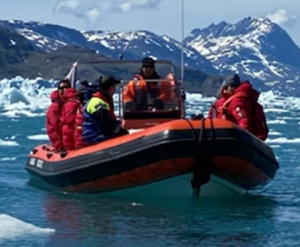NRT: One Health and the Environment
National Science Foundation Research Traineeship (NRT) – Convergence of Social and Biophysical Sciences to Optimize Training in One Health
This interdisciplinary graduate training program in One Health and the Environment is a joint program between the Schools of Biology and Ecology, Economics, Food and Agriculture, Forest Resources, and Marine Sciences, as well as the Departments of Communication and Journalism, Wildlife, Fisheries, and Conservation Biology, and the Climate Change Institute. Students who are accepted can receive degrees through any of the Schools and Departments listed above. More information about the program, how to apply, as well as undergraduate and graduate opportunities can be found on the College of Natural Sciences, Forestry, and Agriculture website. There are 21 M.S. and Ph.D. assistantships available starting September 2020.
Environmental changes, aging human populations, and increasing diseases of animals, plants and people highlight the need for training professionals in an interdisciplinary “One Health” approach: studying disease dynamics at the intersection of human, animal, plant, and environmental health. Addressing the connections between animal, plant, and human health under a changing environment will help advance general scientific knowledge while also generating innovative solutions to critical health problems.

Program Goals
This NRT addresses these problems by training graduate students in the interdisciplinary field of One Health. Trainees will be trained in social, biophysical and health sciences, participate in intensive internships with health-related business, policy and non-profit partners, and be mentored in a culture of innovative, solutions-driven, multidisciplinary research. Trainees will develop their skills and expand their boundaries by interacting with diverse community partners, stakeholders, and scientists. They should develop their cross-disciplinary communication skills and awareness of both underlying scientific principles and challenges related to implementing solutions into management and policy. The traineeship will encourage interdisciplinary research.
Research will focus on two questions:
- What are the social, economic, and ecosystem drivers of health dynamics?
- How do we lead policy and management innovations to improve health outcomes?
This training program is designed to help graduates:
- Become experts in their disciplinary field, while developing strength in another discipline
- Work collaboratively in transdisciplinary teams of peers and stakeholders
- Develop communication skills to successfully engage with diverse audiences
- Acquire knowledge and skills to develop innovative solutions to One Health problems
- Acquire professional skills to enable successful careers in and out of academia
Applying
Students funded by this program can receive free tuition and fees, subsidized health insurance coverage, and a stipend of $34,000 for at least 2 years if they are a PhD student or 1 year for MS students. Only U.S. citizens or permanent residents are eligible for NRT funding. As part of the National Science Foundation’s and commitment to broadening participation, women, underrepresented minorities, first-generation students, veterans, and students with disabilities are encouraged to apply. Anyone interested in applying to the One Health and Environment traineeship is strongly encouraged to first reach out to a faculty member via email to discuss their interests, learn more about research programs, and inquire about the possibility of their serving as your graduate advisor. In the graduate school application, you will be asked to submit a personal statement which should include why you are interested in your desired degree program and the traineeship, your experience working in interdisciplinary teams, and the faculty you would like to work with.
Please direct any general questions you have about the traineeship to Mario Teisl at teisl@maine.edu .



